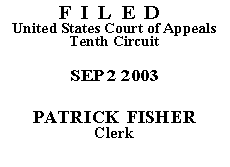

| FRANCISCO LAREZ-JUAREZ,
Petitioner, v. JOHN ASHCROFT, Attorney General of the United States, Respondent. |
|
The immigration judge denied petitioner's requests on two grounds: (1) lack of timeliness; and (2) failure to demonstrate eligibility for political asylum or withholding of removal. The immigration judge held that petitioner's asylum request was time-barred because it was not filed within one year after he arrived in the United States, see 8 U.S.C. § 1158(a)(2)(B), and because petitioner had not shown materially changed or extraordinary circumstances excusing the delay, see § 1158(a)(2)(D). Federal Circuit Courts uniformly hold that they lack jurisdiction to review a determination of timeliness, as we have so held. Tsevegmid v. Ashcroft, 336 F.3d 1231, 1234-35 (10th Cir. 2003) (interpreting the jurisdictional limitation set out in 8 U.S.C. § 1158(a)(3)). Accordingly, we do not address petitioner's arguments concerning the timeliness of his application and therefore do not consider his challenge to the denial of asylum.
This court does, however, have jurisdiction to review the BIA's denial of withholding of removal, id. at 1235. To show entitlement to withholding, an applicant must present "evidence establishing that it is more likely than not that [the applicant] would be subject to persecution" due to his race, religion, nationality, membership in a particular social group, or political opinion. INS v. Stevic, 467 U.S. 407, 429-30 (1984). "Where, as here, the BIA summarily affirms or adopts an immigration judge's decision, this court reviews the judge's analysis as if it were the BIA's." Tsevegmid, 336 F.3d at 1235. The administrative "findings of fact are conclusive unless the record demonstrates that any reasonable adjudicator would be compelled to conclude to the contrary." Id. (quotations omitted).
In ruling on the substance of petitioner's claim for relief, the immigration judge found that petitioner departed from Guatemala in 1994 due to the general circumstances of civil war and that, though there was still unrest in Guatemala related to criminal activities, the civil war was effectively terminated with the signing of peace accords in 1996. Petitioner had not identified a potential persecutor or demonstrated that he would be subject to torture upon a return to Guatemala. Thus, the immigration judge concluded that petitioner failed to meet his burden to show past persecution or a well-founded fear of future persecution. Consequently, petitioner failed to meet the higher standard for withholding of deportation. After our review of the record, we conclude that the immigration judge's decision is supported by substantial record evidence and that a "reasonable adjudicator" would not be compelled on appeal to reject the judge's findings of fact.
Conclusion
As to the denial of the asylum application, we DISMISS the petition for review for lack of jurisdiction. We DENY the petition for review with regard to the denial of withholding of removal.
Entered for the Court
Circuit Judge
*. This order and judgment is not binding precedent, except under the doctrines of law of the case, res judicata, and collateral estoppel. The court generally disfavors the citation of orders and judgments; nevertheless, an order and judgment may be cited under the terms and conditions of 10th Cir. R. 36.3.
1. After examining the briefs and appellate record, this panel has determined unanimously that oral argument would not materially assist the determination of this appeal. See Fed. R. App. P. 34(a)(2); 10th Cir. R. 34.1(G). The case is therefore ordered submitted without oral argument.